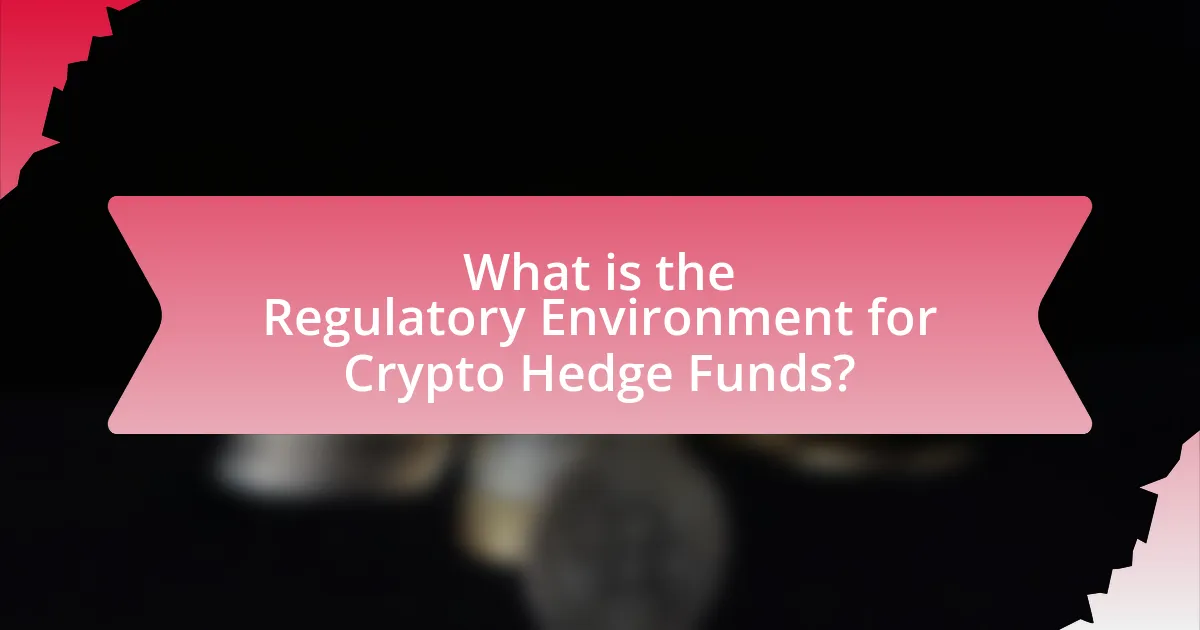The article focuses on the regulatory environment for crypto hedge funds, highlighting the complex and evolving frameworks that differ across jurisdictions. It examines the roles of key regulatory bodies such as the SEC, CFTC, and FCA, and discusses how regulations impact fund operations, investor confidence, and compliance requirements. The article also addresses current trends in regulation, challenges faced by hedge funds in adhering to international laws, and best practices for navigating this landscape. Additionally, it emphasizes the importance of understanding regulatory frameworks for investors to mitigate risks and enhance their decision-making processes.

What is the Regulatory Environment for Crypto Hedge Funds?
The regulatory environment for crypto hedge funds is characterized by a complex and evolving framework that varies significantly across jurisdictions. In the United States, crypto hedge funds are primarily regulated by the Securities and Exchange Commission (SEC) and must comply with federal securities laws, which include registration requirements and adherence to anti-money laundering (AML) regulations. For instance, the SEC has classified certain cryptocurrencies as securities, necessitating compliance with the Investment Company Act of 1940 for funds that offer shares to the public.
In Europe, the regulatory landscape is shaped by the Markets in Financial Instruments Directive (MiFID II) and the Fifth Anti-Money Laundering Directive (5AMLD), which impose similar obligations on crypto hedge funds operating within the European Union. Additionally, the Financial Action Task Force (FATF) has issued guidelines that encourage member countries to regulate crypto assets and their service providers, further influencing the operational framework for hedge funds dealing in cryptocurrencies.
As of 2023, many jurisdictions are actively working to refine their regulations to address the unique challenges posed by digital assets, leading to a patchwork of compliance requirements that crypto hedge funds must navigate. This ongoing regulatory evolution reflects the increasing recognition of cryptocurrencies in the financial system and the need for investor protection and market integrity.
How do regulations impact the operation of crypto hedge funds?
Regulations significantly impact the operation of crypto hedge funds by establishing compliance requirements that govern their activities. These regulations can dictate how funds manage investor assets, report financial information, and conduct trading practices. For instance, the Securities and Exchange Commission (SEC) in the United States requires hedge funds to register as investment advisors if they manage over $150 million, which imposes strict reporting and operational standards. Additionally, regulations can affect the types of cryptocurrencies that funds are allowed to invest in, as certain assets may be classified as securities, subjecting them to further scrutiny and compliance obligations. This regulatory framework aims to protect investors and ensure market integrity, but it can also limit the operational flexibility of crypto hedge funds, potentially impacting their investment strategies and profitability.
What are the key regulatory bodies overseeing crypto hedge funds?
The key regulatory bodies overseeing crypto hedge funds include the Securities and Exchange Commission (SEC) in the United States, the Commodity Futures Trading Commission (CFTC), and the Financial Conduct Authority (FCA) in the United Kingdom. The SEC regulates securities and investment activities, ensuring compliance with federal securities laws, while the CFTC oversees derivatives markets, including futures and options on cryptocurrencies. The FCA is responsible for regulating financial markets in the UK, including crypto assets, to protect consumers and maintain market integrity. These agencies enforce regulations that impact how crypto hedge funds operate, ensuring transparency and investor protection.
How do different jurisdictions approach crypto hedge fund regulations?
Different jurisdictions adopt varied approaches to crypto hedge fund regulations, reflecting their unique legal frameworks and market conditions. For instance, the United States primarily regulates crypto hedge funds under the Investment Company Act of 1940 and the Securities Act of 1933, requiring registration and compliance with specific disclosure and operational standards. In contrast, the European Union is moving towards a comprehensive regulatory framework with the Markets in Crypto-Assets (MiCA) proposal, which aims to create a unified approach across member states, focusing on investor protection and market integrity. Meanwhile, jurisdictions like Singapore and Switzerland have established more favorable environments, with Singapore’s Monetary Authority of Singapore providing clear guidelines for fund managers and Switzerland’s Financial Market Supervisory Authority allowing for innovative structures while ensuring compliance with anti-money laundering laws. These differences illustrate how regulatory environments can significantly impact the operational landscape for crypto hedge funds across the globe.
Why is understanding the regulatory environment crucial for investors?
Understanding the regulatory environment is crucial for investors because it directly impacts their ability to make informed decisions and manage risks effectively. Regulatory frameworks dictate the legal parameters within which investments operate, influencing factors such as compliance requirements, taxation, and market access. For instance, the U.S. Securities and Exchange Commission (SEC) has established guidelines that affect how crypto hedge funds can operate, which can significantly alter investment strategies and potential returns. Investors who grasp these regulations can better navigate the complexities of the market, avoid legal pitfalls, and capitalize on opportunities that align with regulatory standards.
What risks do investors face in an unregulated environment?
Investors in an unregulated environment face significant risks, including fraud, lack of transparency, and market volatility. The absence of regulatory oversight can lead to fraudulent schemes, as there are no mechanisms to verify the legitimacy of investment opportunities. For instance, the U.S. Securities and Exchange Commission reported that in 2018, over 80% of initial coin offerings (ICOs) were found to be scams, highlighting the prevalence of fraud in unregulated markets. Additionally, the lack of transparency can result in investors being unaware of the true financial health of the assets they are investing in, leading to poor investment decisions. Market volatility is exacerbated in unregulated environments, as prices can be manipulated without regulatory checks, resulting in sudden and severe price fluctuations. These factors collectively increase the risk of financial loss for investors.
How can regulatory compliance enhance investor confidence?
Regulatory compliance enhances investor confidence by ensuring that crypto hedge funds operate within established legal frameworks, which reduces the risk of fraud and mismanagement. When funds adhere to regulations, they demonstrate transparency and accountability, which are critical factors for investors seeking to protect their capital. For instance, a study by the CFA Institute found that 75% of investors consider regulatory compliance as a key factor in their investment decisions, indicating that adherence to regulations can significantly influence investor trust. Furthermore, compliance with regulations often leads to better risk management practices, which can result in more stable returns and lower volatility, further boosting investor confidence in the long term.

What are the Current Trends in Crypto Hedge Fund Regulations?
Current trends in crypto hedge fund regulations include increased scrutiny from regulatory bodies, a push for clearer compliance frameworks, and the adoption of more stringent anti-money laundering (AML) and know-your-customer (KYC) requirements. Regulatory agencies like the SEC in the United States are focusing on defining the status of cryptocurrencies and tokens, leading to a more structured approach to fund registration and reporting. Additionally, jurisdictions such as the European Union are working on comprehensive regulations, like the Markets in Crypto-Assets (MiCA) framework, which aims to standardize rules across member states. These developments reflect a global movement towards greater transparency and investor protection in the crypto hedge fund sector.
How are regulations evolving in response to market developments?
Regulations are evolving in response to market developments by becoming more adaptive and comprehensive, particularly in the context of cryptocurrency and digital assets. Regulatory bodies are increasingly recognizing the need to address risks associated with market volatility, fraud, and investor protection, leading to the implementation of frameworks that encompass anti-money laundering (AML) and know-your-customer (KYC) requirements. For instance, the Financial Action Task Force (FATF) has issued guidelines that require countries to regulate virtual asset service providers, ensuring they comply with international standards. Additionally, the U.S. Securities and Exchange Commission (SEC) has intensified scrutiny on crypto hedge funds, emphasizing the need for transparency and compliance with existing securities laws. This evolution reflects a broader trend where regulators aim to balance innovation with consumer protection, adapting to the rapid changes in the financial landscape driven by technological advancements.
What recent legislative changes have impacted crypto hedge funds?
Recent legislative changes impacting crypto hedge funds include the implementation of the European Union’s Markets in Crypto-Assets (MiCA) regulation, which aims to create a comprehensive regulatory framework for digital assets. This regulation, effective in 2024, establishes clear guidelines for the operation of crypto hedge funds, including requirements for licensing, transparency, and investor protection. Additionally, the U.S. Securities and Exchange Commission (SEC) has increased scrutiny on crypto hedge funds, emphasizing compliance with existing securities laws and requiring registration for certain investment products. These changes reflect a global trend towards tighter regulation of the cryptocurrency sector, aiming to enhance market integrity and protect investors.
How are regulators addressing issues of fraud and security in crypto investments?
Regulators are addressing issues of fraud and security in crypto investments by implementing stricter compliance measures and enhancing oversight. For instance, the U.S. Securities and Exchange Commission (SEC) has increased scrutiny on Initial Coin Offerings (ICOs) and cryptocurrency exchanges, requiring them to register and adhere to securities laws. Additionally, the Financial Action Task Force (FATF) has established guidelines for anti-money laundering (AML) and combating the financing of terrorism (CFT) that apply to virtual assets, compelling countries to enforce regulations that mitigate fraud risks. These actions are supported by data indicating that regulatory frameworks can reduce instances of fraud, as seen in jurisdictions with robust compliance requirements.
What role do international regulations play in the crypto hedge fund landscape?
International regulations play a crucial role in shaping the crypto hedge fund landscape by establishing legal frameworks that govern operations, compliance, and investor protection. These regulations help mitigate risks associated with fraud, money laundering, and market manipulation, which are prevalent in the cryptocurrency space. For instance, the Financial Action Task Force (FATF) has issued guidelines that require crypto hedge funds to implement anti-money laundering (AML) measures, thereby promoting transparency and accountability. Additionally, jurisdictions like the European Union are developing comprehensive regulatory frameworks, such as the Markets in Crypto-Assets (MiCA) regulation, which aims to create a unified approach to crypto asset management across member states. This regulatory clarity not only fosters investor confidence but also encourages institutional participation in the crypto hedge fund market, ultimately contributing to its growth and stability.
How do global regulatory frameworks differ for crypto hedge funds?
Global regulatory frameworks for crypto hedge funds vary significantly across jurisdictions, primarily in terms of licensing requirements, investor protections, and taxation policies. For instance, in the United States, crypto hedge funds are often classified as investment companies under the Investment Company Act of 1940, requiring them to register with the SEC unless they qualify for an exemption. In contrast, the European Union has proposed the Markets in Crypto-Assets (MiCA) regulation, which aims to create a comprehensive regulatory framework that includes specific provisions for crypto asset service providers but does not yet impose the same stringent registration requirements as the U.S. framework. Additionally, jurisdictions like Singapore have established a more favorable environment, allowing crypto hedge funds to operate under the Payment Services Act, which provides a clear regulatory pathway while promoting innovation. These differences illustrate how regulatory approaches can impact the operational landscape for crypto hedge funds globally.
What challenges do crypto hedge funds face in complying with international regulations?
Crypto hedge funds face significant challenges in complying with international regulations due to the rapidly evolving nature of cryptocurrency laws and the lack of uniformity across jurisdictions. These funds must navigate a complex landscape where regulations can vary widely, leading to difficulties in ensuring compliance with anti-money laundering (AML) and know-your-customer (KYC) requirements. For instance, while some countries have established clear guidelines, others have ambiguous or non-existent regulations, creating uncertainty for hedge funds operating globally. Additionally, the decentralized nature of cryptocurrencies complicates the enforcement of regulations, as transactions can occur across borders without a central authority. This inconsistency and ambiguity in regulatory frameworks can result in increased operational costs and legal risks for crypto hedge funds, as they strive to adhere to diverse compliance standards while managing their investment strategies.

What are the Best Practices for Navigating the Regulatory Environment?
The best practices for navigating the regulatory environment for crypto hedge funds include staying informed about regulations, engaging with legal experts, and implementing robust compliance programs. Staying informed is crucial as regulations in the cryptocurrency space are rapidly evolving; for instance, the Financial Action Task Force (FATF) has issued guidelines that many countries are adopting. Engaging with legal experts ensures that hedge funds understand the nuances of local and international laws, which can vary significantly. Implementing robust compliance programs, including Know Your Customer (KYC) and Anti-Money Laundering (AML) measures, is essential to mitigate risks and adhere to regulatory requirements. These practices collectively help crypto hedge funds operate within legal frameworks and avoid penalties.
How can crypto hedge funds ensure compliance with regulations?
Crypto hedge funds can ensure compliance with regulations by implementing robust compliance frameworks that include regular audits, adherence to Anti-Money Laundering (AML) and Know Your Customer (KYC) protocols, and staying updated on evolving regulatory requirements. These funds must establish internal controls and risk management processes to monitor transactions and identify suspicious activities. For instance, the Financial Action Task Force (FATF) guidelines mandate that crypto service providers conduct thorough customer due diligence, which is essential for compliance. Additionally, engaging legal experts and compliance officers who specialize in cryptocurrency regulations can help navigate complex legal landscapes and ensure adherence to local and international laws.
What strategies should hedge funds adopt for effective regulatory reporting?
Hedge funds should adopt a comprehensive compliance framework for effective regulatory reporting. This framework should include the implementation of robust data management systems to ensure accurate and timely reporting of financial information. Additionally, hedge funds must establish clear internal policies and procedures that align with regulatory requirements, such as the SEC’s Form PF for private funds, which mandates detailed disclosures about fund operations and risk exposures. Regular training for staff on compliance obligations is also essential to maintain awareness of evolving regulations. Furthermore, leveraging technology, such as automated reporting tools, can enhance efficiency and reduce the risk of errors in submissions. These strategies collectively ensure that hedge funds meet regulatory expectations and mitigate potential penalties for non-compliance.
How can technology aid in maintaining compliance with regulations?
Technology aids in maintaining compliance with regulations by automating processes, enhancing data accuracy, and providing real-time monitoring capabilities. Automated compliance solutions, such as regulatory technology (RegTech), streamline the collection and analysis of data, ensuring that organizations can quickly adapt to changing regulations. For instance, blockchain technology offers transparent and immutable records, which can simplify audits and reduce the risk of non-compliance. Additionally, machine learning algorithms can analyze vast amounts of transaction data to identify suspicious activities, thereby supporting compliance with anti-money laundering (AML) regulations. According to a report by Deloitte, 80% of financial institutions believe that RegTech solutions significantly improve their compliance processes, demonstrating the effectiveness of technology in this area.
What resources are available for staying updated on regulatory changes?
To stay updated on regulatory changes, individuals and organizations can utilize several key resources. Government websites, such as the U.S. Securities and Exchange Commission (SEC) and the Commodity Futures Trading Commission (CFTC), provide official updates on regulations affecting financial markets, including crypto hedge funds. Additionally, legal and financial news outlets like Bloomberg, Reuters, and CoinDesk offer timely reporting on regulatory developments. Industry associations, such as the Blockchain Association and the Managed Funds Association, also publish insights and analysis on regulatory trends. Furthermore, subscribing to newsletters from law firms specializing in financial regulations can provide tailored updates on relevant changes. These resources collectively ensure that stakeholders remain informed about the evolving regulatory landscape.
Which organizations provide guidance on crypto hedge fund regulations?
The organizations that provide guidance on crypto hedge fund regulations include the Securities and Exchange Commission (SEC), the Commodity Futures Trading Commission (CFTC), and the Financial Industry Regulatory Authority (FINRA). The SEC oversees securities laws and regulates investment funds, including those dealing with cryptocurrencies, while the CFTC regulates derivatives and futures markets, which can include crypto assets. FINRA provides guidance on compliance and regulatory standards for broker-dealers involved in cryptocurrency transactions. These organizations collectively shape the regulatory framework that governs crypto hedge funds, ensuring adherence to legal standards and investor protection.
How can hedge fund managers leverage industry networks for regulatory insights?
Hedge fund managers can leverage industry networks for regulatory insights by actively engaging with peers, industry associations, and regulatory bodies to share information and best practices. These networks facilitate the exchange of timely updates on regulatory changes, compliance strategies, and risk management techniques, which are crucial for navigating the complex regulatory landscape of crypto hedge funds. For instance, participation in forums such as the Managed Funds Association or the Alternative Investment Management Association allows hedge fund managers to access expert opinions and collective knowledge, enhancing their understanding of evolving regulations. This collaborative approach not only aids in compliance but also helps in anticipating regulatory trends, thereby positioning hedge funds to adapt proactively.
What practical steps can investors take to mitigate regulatory risks?
Investors can mitigate regulatory risks by conducting thorough due diligence on the regulatory landscape and compliance requirements relevant to their investments. This involves staying informed about changes in laws and regulations that affect crypto hedge funds, such as the SEC’s guidelines on digital assets. Additionally, investors should engage legal and compliance experts to assess the fund’s adherence to applicable regulations, ensuring that all operational practices align with current legal standards. Regular audits and compliance checks can further identify potential regulatory issues before they escalate. By implementing these proactive measures, investors can significantly reduce their exposure to regulatory risks associated with crypto hedge funds.















